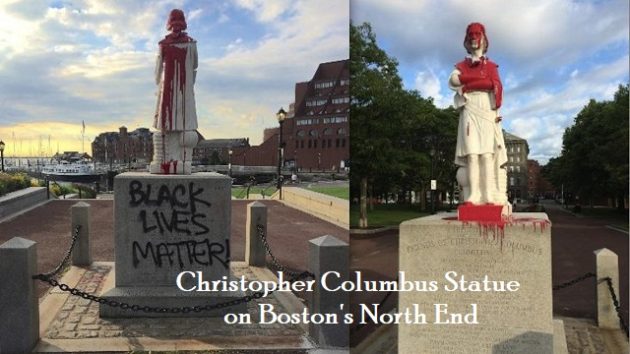Goodbye Columbus
Robert Royal on the political manipulation of history. People suffering from cultural amnesia and self-deceived about their own moral purity cannot be allowed to set the terms of debate.
Almost exactly a quarter-century ago, James A. Clifton, an anthropologist at the University of Wisconsin, called me after seeing an article I had written in First Things, entitled “1492 and All That” (which later became a full-length-book). We were then in a swirl of anti-Western and anti-Christian public emotion over the 500th anniversary (1492-1992) of Columbus’ voyages to the New World, and his alleged role in later mistreatment of Native Americans, slavery, and Christian imperialism.
I expected venom; he offered support. He had written a still fascinating book, The Invented Indian, that sought to distinguish the real achievements of Native Americans from guilt-driven idealizations. For his pains in service to truth, he reaped resentment and threats. In fact, one day someone dressed as an Indian – well, wearing a ridiculous jumble of articles of clothing from very different tribes – came to his front door with a gun. Professor Clifton laughed and turned away, saying: come back when you know something about Indians.
 Some things never change. Especially the largely ignorant, suicidal rage that is now a regular recurrence in American culture, and which is spreading to other Western countries. Quite apart from the vile clash the other day between alt-right and alt-left in Charlottesville (which, as usual, also brought injury to innocents), we seem to have lost the Christian – and human – truth that we’re all imperfect beings. And that without a capacity for tolerating one another’s foibles and ultimately a chance at forgiveness, it’s simply impossible for us to live together.
Some things never change. Especially the largely ignorant, suicidal rage that is now a regular recurrence in American culture, and which is spreading to other Western countries. Quite apart from the vile clash the other day between alt-right and alt-left in Charlottesville (which, as usual, also brought injury to innocents), we seem to have lost the Christian – and human – truth that we’re all imperfect beings. And that without a capacity for tolerating one another’s foibles and ultimately a chance at forgiveness, it’s simply impossible for us to live together.
Puritanical absolutism used to be the hallmark of extremist religious and political groups; now it’s come to infest the very places that should be most aware of differences and contexts, namely our universities and the media.
I learned my lesson about this back when I was trying to form a clear picture of the Age of Discovery. There were and are good historians, amateur and academic, of such matters. Broad-brush condemnations, however, which blur essential moral distinctions, get the airtime.
The great Dominican “defender of the Indians,” Bartolomé de las Casas – for example – described the “sweetness and benignity” of Columbus – in contrast to other Spanish explorers. Cortez could be brutal, though he ended in a monastery doing penance for his sins. Pizzaro was a psychopath. Period. Columbus was something else; despite the unprecedented difficulties he faced in the new cultures he encountered, there were few instances of his mistreating anyone. He was more typically uncertain about how to proceed, as we ourselves often are. Las Casas said of him, “Truly. I would not dare blame the admiral’s intentions for I knew him well and I knew his intentions were good.” Yet he became a cultural whipping boy.
Click here to read the rest of Dr. Royal’s column . . .
![]()
Robert Royal
Robert Royal is editor-in-chief of The Catholic Thing, and president of the Faith & Reason Institute in Washington, D.C. His most recent book is A Deeper Vision: The Catholic Intellectual Tradition in the Twentieth Century, published by Ignatius Press. The God That Did Not Fail: How Religion Built and Sustains the West, is now available in paperback from Encounter Books.



Leave a Reply
Want to join the discussion?Feel free to contribute!